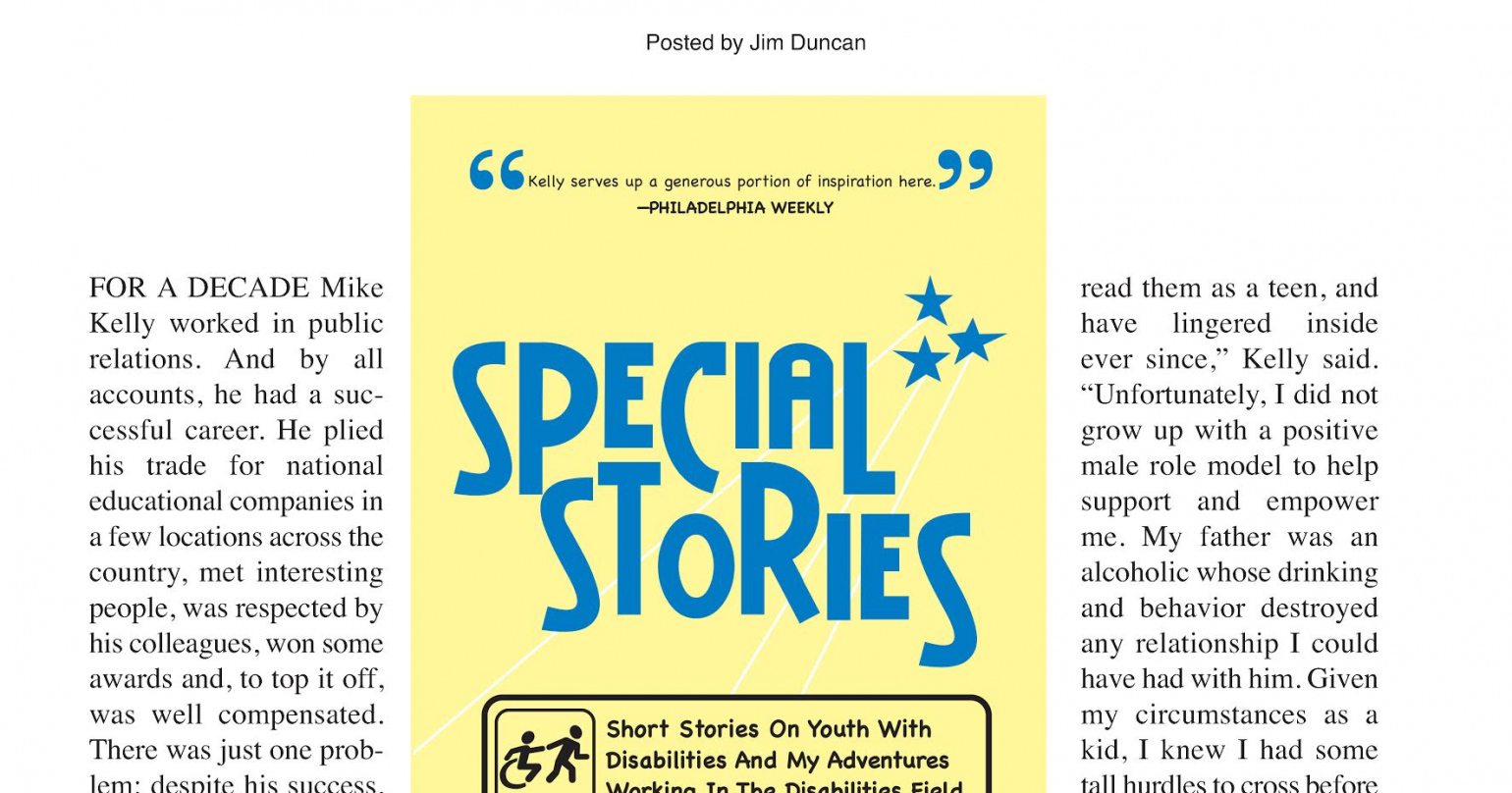Special Stories book- Former PR professional changed careers; now works with kids with disabilities for ‘higher pay’
Posted by Jim Duncan
FOR A DECADE Mike Kelly worked in public relations. And by all accounts, he had a successful career. He plied his trade for national educational companies in a few locations across the country, met interesting people, was respected by his colleagues, won some awards and, to top it off, was well compensated. There was just one problem: despite his success, something inside him had irrevocably changed. Although his wallet was full, his heart had become empty. He knew he needed a change.
As Kelly considered how to spend his time in a different way, he found himself haunted by one of his favorite quotes that the great social reformer Frederick Douglass said: ‘It is easier to build strong children than to repair broken men.’
“These words had resonated with me when I first read them as a teen, and have lingered inside ever since,” Kelly said. “Unfortunately, I did not grow up with a positive male role model to help support and empower me. My father was an alcoholic whose drinking and behavior destroyed any relationship I could have had with him. Given my circumstances as a kid, I knew I had some tall hurdles to cross before I would eventually become a strong man. As a child, I could have benefited greatly by having a positive male role model.”
After some career soul searching and recognizing his own history, Kelly came to the conclusion that he wanted to serve young people who were underdogs in life and needed to be uplifted. He could be that positive male role model to a child. As a result, he began searching for a new career focused directly on building strong children.
A few close to Kelly understood why he needed this change, but others were bewildered and doubted his sanity at the time. Why would anyone in his right mind and in mid-career make a complete career change—while also taking a great reduction in pay to do so? At times, he wondered himself.
Soon into his search, Kelly was fortunate to secure a job with a large nonprofit company that served individuals with developmental disabilities. He was hired as a transition counselor to work with young adults between ages fourteen and twenty-one and with a variety of disabilities. Their challenges included ADD/ADHD, Autism Spectrum Disorders (ASD), Cerebral Palsy, Down syndrome, Dyslexia, Fragile X syndrome, Hearing Impairment, Intellectual Disabilities, Obsessive Compulsive Disorder (OCD), Spina bifida, Tourette syndrome (TS), Visual Impairment, and Williams syndrome (WS), among others.
His responsibilities were to vocationally train students, help them find jobs, and provide support once the students started working to insure success. Furthermore, he empowered his students through mentorship and by connecting them to community resources that would be available for their ongoing transition to adult life and, ideally, self-sufficiency—or as close to it as their particular situation might permit.
Compared to his former career, the pay was low, but the rewards were monumental. “Although my wallet quickly became empty, my heart soon became full and I realized I had actually never been ‘paid’ more in my work. It was—and still is—an incredible feeling,” Kelly said.
Many years later, after working with hundreds of students, each with their own distinct challenges, Kelly’s heart is now rich. And he is beholden to his students because of that.
Kelly’s recently-published book “SPECIAL STORIES: Short Stories On Youth With Disabilities And My Adventures Working In The Disabilities Field” (2017, Vendue Books) is a heartfelt account of what he describes as his “life’s work.” These thought-provoking and heartwarming stories showcase the many abilities individuals with disabilities have—regardless of their challenges—while entertaining, educating, and dispelling societal stereotypes.
“I recognized my job had given me a rare opportunity to see firsthand the inspiring, amusing, beautiful, heartbreaking, and often frustrating adventures of my students. And I felt a responsibility to share these stories with as many people as possible to give my students a collective voice.”
“One of my hopes in writing this book is to dissolve old stereotypes that many people still have about individuals with disabilities. These stereotypes have unfairly maligned an entire segment of our population, which is a shame. I’m hoping the stories will make people think, and above all else, cause folks to recognize the abilities of these kids and the millions out there like them.”
For more information on SPECIAL STORIES …, visit the book’s website at https://www.specialstoriesbook.com

